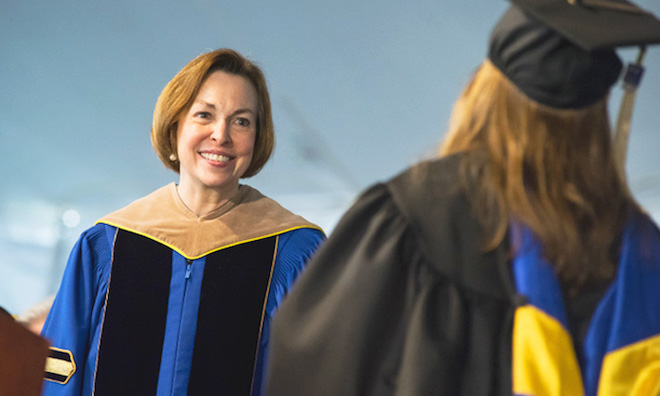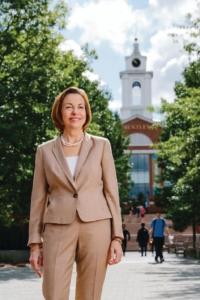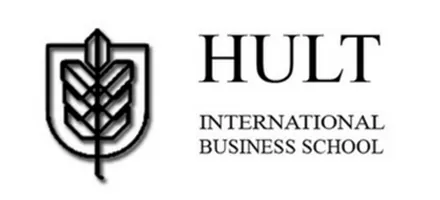
Gloria Larson, president of Bentley University, has written a new book in which she encourages parents and prospective students to look at the college application process as less a matter of where and more a question of how
It’s a common theme these days: high levels of scrutiny placed on the value of higher education, ever-climbing tuition costs, and the all-important question of ROI — return on investment. Often these factors are judged according to where you go to school and what you study. But a new book by Bentley University President Gloria Larson seeks to shift the way students and parents think about college education.
It’s called PreparedU: How Innovative Colleges Drive Student Success, and it’s scheduled to be released today (August 28). In it, Larson writes that it’s a mistake to correlate where you go to college and what you major in with career success.
“It should no longer be about picking a school because it’s so well-known or highly ranked. There needs to be a more thoughtful analysis,” Larson tells Poets&Quants.
CHOOSING A COLLEGE ISN’T JUST ABOUT WHERE YOU GO

Gloria Larson, president of Bentley University and author of PreparedU: How Innovative Colleges Drive Student Success
Larson became president of Bentley University in 2007 after a career in law, government, and business. During her tenure, The Princeton Review has ranked Bentley first in the nation for career services and internships. In June she announced she will leave her position in 2018.
In her book’s opening chapter, Larson points out several issues that show the flaws in focusing on the where and the what in the college selection process.
If you’re a student or parent and you’re in the middle of that process, she writes, “You face a national and global outlook dramatically different from that of twenty years ago. College has never been more expensive; the job outlook and ‘hot jobs’ lists change year by year; everything from manufacturing to entertainment to economics is globalized; and only the fabled ‘1 percent’ of families seems secure.”
Larson says this begs the question: How can students prepare for work and life 10, 20 years from now? “Anyone considering the value of a college education has to ask that question,” she writes.
HOW MATTERS MORE THAN WHERE
Larson’s answer is simple and serves as the main premise of her book: Focus on the how. “How is a critical question for students and parents that should precede the question of where to go to college,” she writes.
“Gone are the days of simply asking, ‘Tell me about your business school and its core curriculum,’” she tells P&Q. “Students and parents should be asking, ‘How is business connected to other things at the school? Will I have enhanced right- and left-brain capabilities when I come out of this?’”
Larson rattles off a list of questions that students and parents need to ask before choosing a college: “How do you keep current? How do you partner with employers? What kind of internship program do you have so I can ensure I’m able to apply what I learn before I graduate?”
A RALLYING CRY FOR EDUCATORS EVERYWHERE
Larson argues that the “how” element is uncovered in the ways students prepare for today’s constantly changing workforce. But she doesn’t merely place the onus on students and parents. PreparedU serves as a rallying cry for educators to “get with it!”
“All schools need to think hard about what kind of innovation they need to have, not just how they’re meeting the technical expectations students need to meet when they enter into the workforce,” she says. To this end, she has made it her business to see more educators adopt hybrid learning, an educational model that combines business education with arts and sciences to better prepare graduates.
Larson says besides Bentley, there are colleges and universities — large and small — where innovative models of education are being used. For example, “The College of Engineering at Olin is tiny, but highly regarded,” she says. “They’ve partnered with Babson and Wellesley to help their students gain business sensibility. They’re delivering innovation by partnership.
“Davidson College is another school I greatly admire. Here’s a school that’s not in a major metropolitan area, yet they’re delivering through a really strong internship program. Really, no school these days should have an excuse.”
On the business school front, Larson names the University of Michigan’s Ross School of Business, NYU’s Stern School of Business, Columbia Business School, Northwestern’s Kellogg School of Management, and UC-Berkeley’s Haas School of Business as schools that are adopting hybrid learning curricula or other innovative ways to deliver educational value.
HELPING STUDENTS, PARENTS, AND EDUCATORS ASK THE RIGHT QUESTIONS
“My rationale for this book is that it doesn’t matter what type of school you are,” Larson says. “Ask yourself what are you offering and how you bring it all together in a thoughtful way.”
The ultimate goal, she adds, is that chapter by chapter readers will start to identify the right questions to ask themselves, whether they be potential students, parents, educators, or employers.
“If this can help some parents and some future students and employers and schools think more thoroughly about each of their respective roles, than that’s a hallelujah moment for me!” she says.
DON’T MISS: IS A COLLEGE DEGREE WORTH THE MONEY? and THE BEST BOOK EVER WRITTEN ON ELITE COLLEGE ADMISSIONS
© Copyright 2026 Poets & Quants. All rights reserved. This article may not be republished, rewritten or otherwise distributed without written permission. To reprint or license this article or any content from Poets & Quants, please submit your request HERE.











